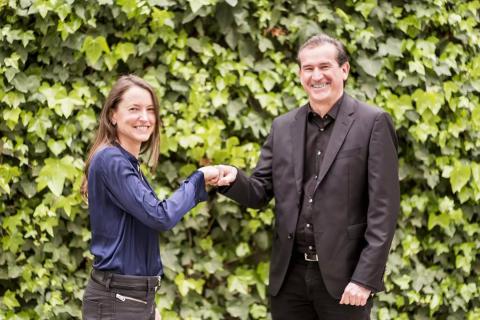From trail running to tackling one of the planet’s biggest environmental challenges, Pack2Earth is rewriting the story of packaging.
Pack2Earth plant- and mineral-based materials break down naturally at ambient temperature, offer the durability the industry demands, and fit seamlessly into existing production lines, making them a win for the planet, our health, and business.
The story of Pack2Earth began far from laboratories or boardrooms. Co-founders Françoise de Valera and Glenn Du Pree, both avid trail runners and long-distance hikers, noticed a troubling pattern: sportspeople leaving behind empty gel sachets and snack wrappers in nature. So, they asked themselves a simple but radical question: what if packaging could simply disappear if left outdoors?
Initially, the idea centered on sports nutrition – products that require durable, long-shelf-life packaging. They realised that a simple solution was not currently available. Instead of giving up, they hired engineers and chemists, built prototypes based on plant and mineral materials, and secured their first grant in 2017. This determination marked the beginning of Pack2Earth – a company now ascending to impressive heights.
Food sector at the heart of the global plastics problem
The challenge they set out to tackle is staggering. Each year, the world produces over 450 million tonnes of plastic, much of it used only once. Plastic pollution underscores both the lobbying power of fossil-fuel industries and the failure of governments to reach consensus on ambitious global action. A shocking 91% is never recycled, and contaminated food packaging is often deemed unrecyclable from the start. Even so-called “sustainable” alternatives like recycled plastic fall short as they still release microplastics, carry toxins, and require virgin plastic inputs after a few cycles.
The result is a tide of pollution that clogs landfills, pollutes oceans, and leaches into ecosystems. Pack2Earth is tackling this head-on with home compostable materials suitable for packaging applications and other uses. Unlike industrial compostables that often linger as microplastics, Pack2Earth’s materials are fully biodegradable at ambient temperature, whether in our homes, landfills or even open air.
Market-ready packaging solutions based on plants and minerals
From the very beginning, Pack2Earth has followed a determined path of growth. In late 2017, the team secured its first €60,000 grant from Spain’s Ministry of Science, which enabled them to develop a business plan and create initial prototypes. These early successes paved the way for a significantly larger Horizon 2020 grant of €1.9 million, allowing the startup to expand its R&D efforts and establish a specialised team of chemists and packaging engineers.
This steady investment in science and people has resulted in two market-ready, patented high-barrier materials. The first is a flexible film, available in three thicknesses, with a technology readiness level (TRL) of 9 (the highest possible) and is currently being purchased by clients for packaging dry, semi-liquid, and even liquid products with long shelf-life requirements.
The second is an injection material, designed to be moulded into durable objects such as cups, bowls, and caps. While it is already usable in non-food contact applications, the formulation is being fine-tuned so that within months it will also be suitable for food contact, opening the door to a wide range of new markets.
With our injection material, you can make articles that can actually be reused up to 200 times before you compost them. That ties in perfectly with the new EU Packaging and Packaging Waste Regulation, which focuses not just on recyclability but also reusability
Françoise de Valera, Co-founder & CEO of Pack2Earth
Addressing health concerns through material innovation
Pack2Earth isn’t only about replacing plastics; it is about protecting human health and reshaping our relationship with everyday materials. The environmental case for compostable packaging is clear, but the founders were shocked by the health implications of fossil plastics. Scientists are concerned about the health risks of ingesting large quantities of microplastics, and there is ongoing research to understand the links with specific diseases.
By shifting the conversation from climate and pollution to something deeply personal - the health of individuals and their families - Pack2Earth hopes to accelerate behavioural change and adoption of its solutions. The company has set ambitious but measurable targets: by 2030, its materials aim to save 186,000 metric tons of fossil plastic, equivalent to preventing around 366,000 metric tons of CO₂ emissions.
Looking ahead, the team is also working on sourcing raw materials from agro-industrial side streams (essentially the by-products of food production) to make its formulations even more sustainable and fully European.
From weathering the COVID storm to securing game changing investment
EIT Food has been a pivotal partner throughout Pack2Earth’s journey. During the pandemic, the startup benefited from the COVID-19 Bridge Fund, which provided the stability to continue product development at a critical moment. Later, through the EIT FAN accelerator, Pack2Earth received validation, mentoring, and additional equity investment. Pack2Earth seized this opportunity and was the winner of the 2024 EIT Food FAN Packaging Tech Validation Award!
These opportunities helped the team move from research and prototypes to a commercial stage.
EIT Food helped us a lot because we were looking for investment. With COVID it was almost impossible. And we were lucky enough to be one of only eight companies in which EIT Food invested through their COVID Bridge fund. And that gave us enough money to last through the COVID pandemic and to come out the other side with strong products that we could start to get ready for commercialisation
Françoise De Valera, Co-founder & CEO, Pack2Earth
To support the crucial next stage of transition from R&D to commercialisation, the company closed a €1.6 million investment round in 2025, led by Swanlaab Venture Factory. This injection of capital is helping Pack2Earth finance first production batches, complete additional certifications and life cycle analyses, and strengthen its sales and AI formulation teams.



 Share this page
Share this page


